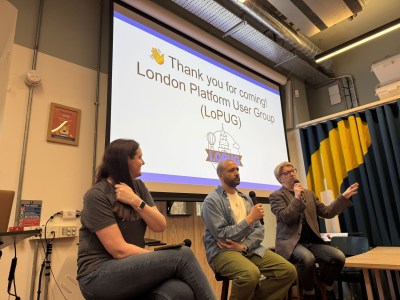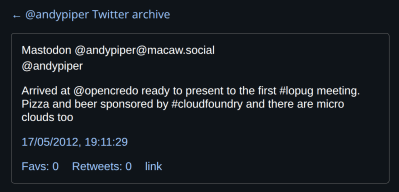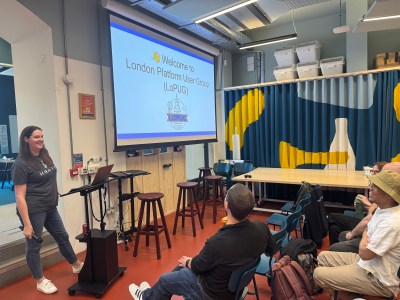In my Apache Mesos fork, the Docker containerizer now also supports metrics under cgroups v2.
#Mesos
Thirteen years ago yesterday, I was speaking at the first meeting of the London Platform-as-a-Service User Group (now, the London Platform User Group, aka LOPUG). I’d joined VMware a few weeks before, and this was one of my earliest speaking gigs telling the story about the open source Cloud Foundry platform.
At least I archived the Tweet about it, because apparently I didn’t write a blog post, and I can’t find the slides from that event. Look, historical proof! ⬆
Yesterday, the meetup celebrated 13 years since that first edition!
The plan was to bring together the original presenters and hosts as a panel to revisit the topics and talk about what had happened in the industry and in our careers in the meantime. Unfortunately, the original host (Russ) was unable to join at the last minute, but Tareq and I were the original speakers, and were both available for the panel, moderated by my friend Paula Kennedy.
I wrote a short thread on Mastodon with some thoughts – here’s a slightly longer version.
At #Accurx in London for a panel revisiting the first edition of the London Platform User Group (LOPUG) – I was a speaker at the first event, 13 years ago (in my #CloudFoundry days), and on the panel this evening! https://meetu.ps/e/NSspR/vXk8/i
— Andy Piper (@andypiper) 2025-05-14T17:42:31.745Z
The evening was a trip down memory lane, and a thought-provoking look at how much has changed – and what might be coming next. Thirteen years ago, my focus was on telling the Cloud Foundry story, advocating for private and hybrid cloud solutions based on open source to VMware (later Pivotal) customers across the UK, Europe, and beyond. Platform as a Service (PaaS) was the buzzword, and we were excited about its potential.
A couple of years after the original event, I joined Twitter. Now that I’m a few years on from that period of my life, I actually had to go back and remind myself of the internal Twitter cloud stack of Apache Mesos and Aurora etc. There’s a good piece about that (featuring my buddy Chris Anisczyk from back in the day!) if you want to take the same diversion I did ahead of the meetup last night!
Fast forward to today, and the PaaS market has been significantly reshaped, largely by the rise of Kubernetes and other technologies. The landscape is very different. Apparently, somewhere along the line we lost the ease of deployment that platforms like Heroku and Cloud Foundry were well known for … progress 🤷🏻
During the panel, I was asked about future predictions. My attention turned towards the growing push for digital sovereignty, particularly in Europe, and the emergence of concepts like the EuroStack. It’s a clear indication of a shift in priorities, and a desire for greater control over data and digital infrastructure.
It was an interesting moment of self-reflection too. I realized how my own world view has evolved, broadening from my primary focus on enterprise software stacks in my IBM and VMware days, to encompass a wider social perspective which connects to my work with social networks, and more evolved views about politics and economics in general.
Later in the evening, there was a brief discussion about whether current global events and trends are steering us towards a more complex business and technical environment. The suggestion was that an increased need for local negotiations and agreements could potentially slow everything down. This seems very likely, to me – the consequence of tariffs, breaches of trust, and protectionist behaviours from those looking to control their own domains, as opposed to those who champion collaboration and shared respect as drivers of progress.
And you know what? I find myself thinking that slowing things down might not necessarily be a bad thing. Perhaps a more deliberate pace is exactly what’s needed right now.
It was a really engaging evening, and it’s nice to see LOPUG still going strong. Thanks to Paula and the team for inviting me to join the panel – this was a lot of fun to come back to.
(shout out to Daniel Bryant for the photo I’m in above, thanks Daniel!)
https://andypiper.co.uk/2025/05/15/revisiting-the-clouds/
#100DaysToOffload #aurora #cloudFoundry #Computing #digitalSovereignty #economics #enterprise #EuroStack #events #kubernetes #London #lopug #meetup #mesos #panel #pivotal #politics #regulation #society #talks #Technology #Twitter #vmware
Thanks to my Tensorflow framework for Apache Mesos, it is very easy to calculate models on multiple servers. 🥳
Gestern mit Christian #Mesos (Name ist Foreshadowing), #Neuland (🤩 Mischung aus Savannah Park und Harmonies), #TreeSociety (darf gerne oben in den Bäumen bleiben)
Am Wochenende wieder eine Menge Spiele kennengelernt, leider meist die Bilder vergessen. 🙈 Sehr abwechslungsreiche Titel sind es geworden.
#VampireTheMasqueradeMilanUprising
#DorfromantikSakura
#TowerUp
#MESOS
#BombBusters
#Waffelzeit
#Roaring20s
#StoryBoxAventures
#Ichhabefertig
#Brettspiele
Oh wait, the next sentence says this is impossible, never mind, I guess we're all out of a job.
"Even if such a scheduler were feasible, this complexity would have a negative impact on its scalability and resilience."
My goodness, the original Mesos paper is prescient:
"Mesos [could] implement a centralized scheduler that takes as input framework requirements, resource availability, and organizational policies, and computes a global schedule for all tasks. [...] The scheduler would need to provide a sufficiently expressive API to capture all frameworks’ requirements, and to solve an online optimization problem for millions of tasks."
Have you met our lord and saviour, YAML?
🌖 Uber將4000多個微服務遷移到新的多雲平臺,運行Kubernetes和Mesos
➤ Uber將4000多個微服務遷移到新的多雲平臺Up,為雲端遷移做準備
✤ https://www.infoq.com/news/2023/10/uber-up-cloud-microservices/
Uber將大部分容器化的微服務從µDeploy遷移到名為Up的新的多雲平臺,為將其計算基礎設施的相當部分遷移到雲端做準備。Uber花了兩年時間使其眾多微服務可移植,以便在不同的計算基礎設施和容器管理平臺之間遷移。Uber的平臺團隊於2018年開始研究一個新的多雲、多租戶聯邦控制平面,負責自動化服務部署和基礎設施遷移。新平臺Up將成為服務工程師與基礎設施系統互動的主要工具,並管理和執行最佳實踐以實現安全的代碼部署。Uber花了兩年時間使所有無狀態的微服務可移植,以便在區域和區域中集中管理它們的放置,並且幾乎自動地遷移到Up,從而節省了大量的金錢並大大減輕了服務團隊的維護負擔。
+ Uber的微服務遷移將為公司節省金錢並提高
#Uber #微服務 #多雲平臺 #Kubernetes #Mesos
Uber migrates microservices to multi-cloud platform running Kubernetes and Mesos
https://www.infoq.com/news/2023/10/uber-up-cloud-microservices/
#ycombinator #uber_up_cloud_microservices #Development #Architecture_Design #DevOps #Kubernetes #Microservices #Oracle #Cloud_Native #Containers #Cloud_Migration #Architecture #Cloud_Computing #Mesos #Google_Cloud
I've developed an Apache Mesos framework for #TensorFlow V2, enabling the distribution of TensorFlow-based machine learning models across #Mesos clusters to accelerate model computations.
#MESos sounds interesting...
https://www.youtube.com/watch?v=UTWK_bIJf1U
The next unofficial update for Apache Mesos is currently in development, marking a significant stride towards a more streamlined and maintainable #Mesos version.
I've updated Mesos-DNS to Version 0.9.0.
This version includes the following changes:
- Added support for reverse lookup (thanks to Christian Marie)
- Updated all Go modules
- Migrated from jwt-go to golang-jwt
I've updated my unofficial Apache #Mesos fork to version 1.11.0-0.3.0. This update includes the native CNI support for the #docker executer.
It uses the same configuration as the Mesos executor. If you are already using it with CNI, you do not have to make any changes or additions.
Please note that this version of Mesos is unofficial. If you encounter any issues, please refrain from bothering #Apache or the Mesos community. Instead, kindly open an issue: https://github.com/m3scluster/clusterd
Luka w runC - ucieczka z kontenera ( https://nfsec.pl/security/6109 ) #linux #lxc #docker #kubernetes #mesos #container #security #twittermigration
Stumbled across some #Mesos at work yesterday.
This is a brief demonstration how to run a #MicroVM using my #Firecracker executor within Apache #Mesos.



